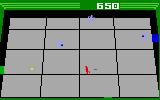 As of yesterday, I have became a full-fledged Ubuntu member!
As of yesterday, I have became a full-fledged Ubuntu member!
Ubuntu is the Linux-based operating system I use on my desktop at home and at work, and in fact I’m also using it to serve up this web site. I’ve been running for a year now, and started to become active in helping with development of the software, and with technical support, in August of last year. Being an Ubuntu member, though, will mean that I have a vote in the governance of the project. 🙂
Becoming an Ubuntu member isn’t so simple a matter as adding your name to some list. Official membership is given only to people who have demonstrated ongoing and significant contribution to the Ubuntu community. This could be helping to triage or to fix bugs, contributing artwork or documentation, offering help to users with technical difficulties, or actively advocating Ubuntu in your local community.
In order to become members, applicants need to appear before the Community Council, and concretely demonstrate that they have been and will continue to be a significant asset to the Ubuntu community. This pretty much means that you need to have been documenting anything important that you’ve been doing on your page in the Ubuntu community wiki (here’s my wiki page), so that you can point them at it, along with your launchpad page if your contributions tend to be related to bug fixing or triage. The Community Council is the small group of the community leaders who are directly responsible for the directions Ubuntu takes as a project. At this moment, there are only four members in the council (this is probably going to double very soon).
After successfully surviving the council’s scrutiny, you are then rewarded with:
- an official ubuntu.com email address (mine will be micahcowan@ubuntu.com, but it won’t be set up yet for maybe a week);
- the right to print and distribute official Ubuntu business cards; 🙂
- a snazzy ubuntu/members/yourname hostname cloak for your IRC communications on irc.freenode.net; and, of course,
- a vote in community government decisions!
The main reason I’m excited about obtaining membership, though, is that it’s the first step towards becoming an Ubuntu developer, something I’m currently pursuing. Being a developer means I can upload packages to the Ubuntu software repositories (that is, upload new software or new versions of software that will become part of the Ubuntu operating system—currently, I need to have a sponsor upload for me), and will require ademonstrated ability to package software for the system, which can be fairly complex sometimes. I already have some experience in this regard, as I have packaged fixes to existing software already (such as this package I improved); but I will need to do a good deal more.
Update: my micahcowan@ubuntu.com address is now working! 🙂

 Well, I finally completed a little toy project I’d been working on, off and on, for a while.
Well, I finally completed a little toy project I’d been working on, off and on, for a while.